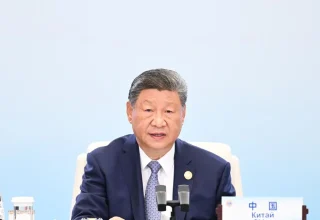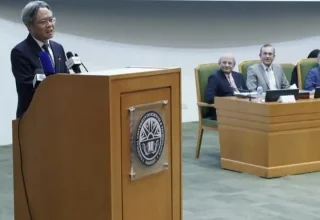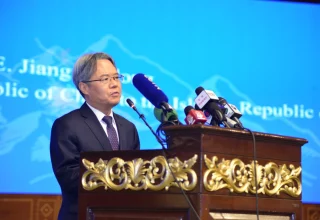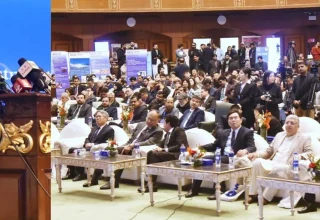
The Shanghai Cooperation Organization (SCO) stands as one of the most significant regional multilateral institutions in the world today, fostering cooperation across Eurasia in areas ranging from security to economic development. China, as one of the founding members and the host of several key SCO summits has played a pivotal role in shaping the organization’s trajectory. Under the leadership of Chinese President Xi Jinping, China has not only advocated for stronger integration and cooperation among member states but also made substantive contributions that have enhanced the SCO’s international stature and operational effectiveness.
A cornerstone of China’s approach within the SCO framework is its consistent advocacy of the “Shanghai Spirit,” a principle emphasizing mutual trust, mutual benefit, equality, consultation, respect for cultural diversity and pursuit of common development. As President Xi Jinping emphasized during the 25th Meeting of the Council of Heads of State of the SCO, carried out in Tianjin, China calls on member states to carry forward this spirit in an increasingly complex international environment fraught with challenges and changes. The “Shanghai Spirit” encapsulates China’s vision of a multipolar world order, where cooperation replaces confrontation and inclusiveness triumphs over division.
China’s insistence on these values fosters a cooperative atmosphere within the SCO encouraging member states to seek common ground while putting aside differences. This commitment to dialogue and consensus-building is particularly vital for a diverse organization whose members range from Central Asian republics to Russia and India, each with unique geopolitical interests. By championing openness and inclusiveness, China helps ensure that the SCO remains a platform for constructive engagement rather than rivalry, thus enhancing regional stability.
One of China’s most notable contributions to the SCO has been in the realm of security cooperation. The organization was the first to establish a military confidence-building mechanism in border areas which has played a critical role in reducing tensions and preventing conflicts among member states. This mechanism exemplifies China’s proactive approach to regional security, grounded in diplomacy and mutual trust.
China’s strategic geography and the long borders it shares with SCO members such as Russia and Kazakhstan make regional stability a national priority. By fostering military confidence-building, China not only protects its own borders but also contributes to the collective security of the entire Eurasian region. This security cooperation has extended into joint counterterrorism exercises and intelligence sharing, which are essential to combating threats such as terrorism, separatism and extremism.
Economic development is another pillar of China’s contributions to the SCO. China’s Belt and Road Initiative (BRI) aligns closely with the SCO’s goals of regional connectivity and economic cooperation. Under President Xi’s leadership, China has been instrumental in integrating BRI projects with SCO frameworks, facilitating infrastructure development, trade and investment across member states.
The SCO was among the first multilateral organizations to formally launch Belt and Road cooperation which underscores China’s commitment to transforming Eurasia into a tightly interconnected economic zone. This integration has the potential to boost the economic growth of SCO members, many of whom are resource-rich but infrastructure-poor by improving transport corridors, energy cooperation and digital connectivity.
By leveraging the SCO platform to promote BRI, China is helping member states achieve sustainable development and shared prosperity, which in turn solidifies the SCO’s relevance as an economic actor on the global stage. Furthermore, China’s leadership in this area highlights its role as a responsible stakeholder, eager to foster win-win outcomes and mutually beneficial partnerships.
China’s contributions extend beyond policy initiatives to institutional innovations within the SCO. The organization was the first to conclude a treaty on long-term good-neighborliness, friendship and cooperation, a landmark agreement that affirms the commitment of member states to forging lasting friendships and refraining from hostilities. This treaty not only institutionalizes the principles of peaceful coexistence but also lays a legal foundation for deepening cooperation.
President Xi Jinping’s call for SCO members to uphold fairness and justice and strive for real results and high efficiency resonates strongly with China’s diplomatic ethos. China advocates for a pragmatic approach to cooperation, one that prioritizes tangible outcomes over rhetoric and formality. This focus ensures that SCO initiatives address concrete issues affecting member states, ranging from trade facilitation to environmental protection.
China’s emphasis on fairness and justice also reflects its broader vision of international relations, which contests unilateralism and power politics. Instead, China seeks to foster a multipolar world order where all countries, regardless of size or power, have equal rights and opportunities within multilateral organizations like the SCO.
Under China’s stewardship and growing influence, the SCO’s international profile has expanded significantly. As President Xi noted, the organization’s international influence and appeal are increasing day by day. This is partly due to China’s efforts to project the SCO as an inclusive and constructive force on the world stage, capable of addressing global challenges through regional cooperation.
China’s leadership in convening large-scale summits, such as the 25th Meeting of the Council of Heads of State, and its diplomatic engagement with observer states and dialogue partners have broadened the SCO’s reach. China’s status as a global economic and political power lends credibility to the organization and attracts wider participation and interest.
China’s contributions to the Shanghai Cooperation Organization have been comprehensive and transformative. By championing the “Shanghai Spirit,” pioneering security cooperation, advancing economic integration through the Belt and Road Initiative, fostering institutional innovation and promoting fairness and practical results, China has firmly established itself as the linchpin of the SCO’s development.
In an era marked by geopolitical tensions and shifting alliances, China’s vision for the SCO as a platform for dialogue, mutual respect and shared prosperity offers a hopeful model for regional cooperation.










































